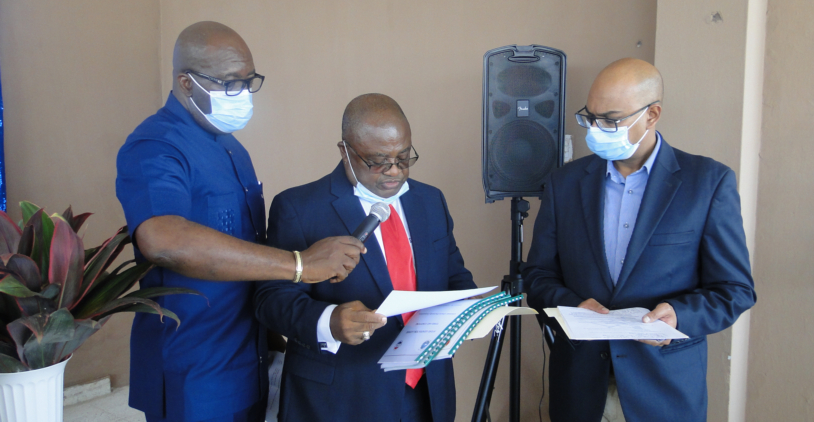 |
 |
LEC Becomes Liberia’s First Operator

Since its establishment in 2015, the Liberia Electricity Regulatory Commission (LERC), on Tuesday 9 March issued several electricity licenses to the Liberia Electricity Corporation (LEC). This means LEC no longer enjoys monopoly in the sector and is now one of several operators in Liberia.
The six licenses issued to LEC are: Generation (hydro and thermal plants) Transmission, Distribution, System Operation and Import.
Dr. Lawrence D. Sekajipo, LERC’s Chairman, presenting the licenses to LEC authorities said the Commission was acting in accordance with the September 2020 Electricity Licensing Regulations, Micro Utility Licensing Regulations, and the Licensing Handbook, issued under its rule making powers consistent with the 2015 Electricity Law of Liberia.
“These instruments provide the framework for licensing operators within the interconnected national grid network and operators of mini-grid and off-grid systems, and standalone systems respectively”, Dr. Sekajipo told the gathering at the ceremony.
LEC, Dr. Sekajipo asserted, as required by law like all operators is to obtain a license for all aspects of its operations, and that the Corporation has duly complied by completing the license application processes as laid down by the Commission.
“LERC is sending out a clear and distinct message that Liberia is open for the critical investment required to cover the infrastructural deficit within the electricity sector; and that the Commission is currently developing the Tariff Regulations and the Technical Codes which will further define the rules for ensuring smooth operation and the sustainability of sector”, he asserted.
Dr. Sekajipo said what the Commission and consumers require of LEC is adequacy in electricity generation; grid resilience; distribution equipment reliability and enhanced customer service, which are prerequisites for instilling investor and consumer confidence in the electricity supply industry. “It is the Commission’s expectation that LEC will transit quickly towards achieving these goals within the established targets and benchmarks”.
He appealed to the Government of Liberia and development partners for their continued support to the LERC in order to achieve the stated objectives as outlined in the 2015 Electricity Law of Liberia; noting It would be difficult to function independently in keeping with the 2015 Electricity Law without sustainable funding.
“Funding challenges could create difficulty in retaining trained, qualified, experienced, and reliable staff. Investments in LERC are unlikely to achieve the intended objectives of transforming the electricity sector without continued stakeholders’ participation and involvement”, he said.
Dr. Sekajipo expressed thanks to Millennium Challenge Corporation, Millennium Challenge Account Liberia, European Union Delegation to Liberia Long-Term Technical Assistance (LTTA) through the National Authorizing Office and EU LTTA technical team for their continued guidance and support to the work of the Commission.
Responding on behalf of the Corporation, its Chief Operation Officer (COO) Prish Govender, told the gathering at the ceremony that LEC over the last three years has experienced a huge growth in its customer base in the energy sector, something he said has been supported by the transmission and distribution systems, as well as the generation space of the Mt. Coffee Hydro Power station and the Bushrod Island station.
COO Govender said commercial losses and the constraints in connecting all consumers are some of the challenges that affect the financial sustainability of LEC. Despite these constraints, he said the future is bright for the Corporation. “With all those challenges, the future remains very positive with the support of the Liberian Government and the support of our consumers,” he said.
Also making remarks, Mr. Monie Captan, CEO Millennium Challenge Account-Liberia, a key donor to the Commission said the establishment of an electricity regulator was a condition precedent for the Compact to enter into force that enable Liberia to benefit US$257 million grant from the United States government to invest in the energy sector.
He said after the economic constraints analysis was conducted it was established that the lack of electricity was one of the constraints to economic growth for Liberian businesses.
Mr. Captan expressed delight that after years of investment in the Commission that it has now begun issuing licenses to operators.
Madam Stefania Marrone, the acting head of Cooperation representing the European Union Delegation to Liberia described the licensing ceremony and certification of Liberia first private operator producing, transmitting and distributing energy for the people of Liberia as a milestone for the private operators in the energy sector of Liberia.
European Union has financed the Monrovia Consolidation of Electricity with 52 million Euros, to support the Government of Liberia in its effort to provide sustainable and stable electricity to all citizens; and of that amount secured a total envelop of 2.8 Million Euros for a 3-year Long Technical Assistance for Capacity Building and Institutional Support to the Liberia Electricity Regulatory Commission (LERC) and to the Ministry of Mines and Energy”, Madam Marrone told gathering at the ceremony.
The Chairman of the House Committee on Lands, Mines and Energy, Rep. Vincent Willie pledged the Legislature’s support to LERC.
The ceremony was graced by Hon. Gesler Murray, Minister for Mines and Energy, Hon. J. Aloysius Tarlue, Jr. Executive Governor of the Central Bank of Liberia and former LERC Chairman, Hon. Vicent Willie, Chairman of House Committee on Lands, Mines, Energy, Natural Resources & Environment; the National Authorizing office (NAO), the Millennium Challenge Corporation and Millennium Challenge Account Liberia.